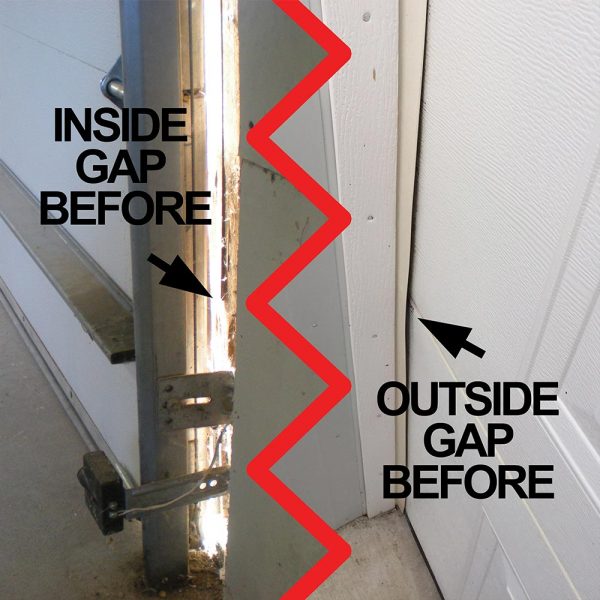Fix the gap
Table of Contents
Table of Contents
If you’re someone who has experienced cold air coming through your garage door or pesky critters making their way inside your home, it’s time to address the issue of garage door gaps. Sealing these gaps will not only improve the temperature regulation of your home but also enhance security measures.
As a homeowner, you may be unaware of the gaps that exist around your garage door. These gaps can lead to increased energy bills, water damage, and unwanted guests such as insects and rodents. Keeping your home free from drafts, moisture, and pests is crucial, and sealing garage door gaps is a simple yet important task.
How to Seal Garage Door Gaps
There are multiple ways to seal gaps around your garage door. The most common methods include:
Weatherstripping
Weatherstripping is one of the easiest and most cost-effective ways to seal garage door gaps. This process involves attaching a rubber or vinyl strip to the bottom and sides of the garage door to create a seal against the ground and the door frame. This method is best for smaller gaps.
Sealant
If your garage door has larger gaps, using a sealant may be your best option. This method involves sealing gaps around the garage door frame and bottom with a specialized caulk or foam sealant.
Threshold Seal
Installing a threshold seal, also known as a garage door seal, on the floor where your garage and driveway meet, can prevent water and debris from entering your garage, and also provides insulation from cold and hot air.
Insulation
For those who spend time in the garage, adding insulation to the garage door can be a cost-effective method to make the area more comfortable to spend time in and to reduce energy bills. Insulation materials include fiberglass batts, foam board, or reflective insulation.
My Experience with Garage Door Gaps
A few years ago, I noticed cold air penetrating through my garage door during the winter months. Upon inspection, I realized the gaps around my garage door were the primary cause. I decided to try weatherstripping to seal the gaps and it was a game-changer. My home was more comfortable, and my energy bills decreased substantially.
One thing to keep in mind while sealing garage door gaps is to make sure the garage door is properly aligned before adding any weatherstripping seals. Professional installation may be required if you are unsure.
The Benefits of Sealing Garage Door Gaps
Sealing garage door gaps is essential for multiple reasons, including:
- Improved temperature regulation
- Increased energy efficiency
- Reduced noise pollution
- Enhanced security against pests and burglars
Which Method is Right for Me?
The right method for sealing your garage door gaps depends on the level of gaps present.
- Weatherstripping: Best for smaller gaps
- Sealant: Best for larger gaps on the sides and top of the garage door
- Threshold Seal: Best for the bottom of the garage door
- Insulation: Ideal for those who spend time in the garage and for reducing energy bills
Question and Answer
Q: Can I seal garage door gaps myself?
A: Yes, sealing garage door gaps is a simple task that can be done by most homeowners. However, if you are unsure of the process or the gaps are severe, consider hiring a professional.
Q: How much does it cost to seal garage door gaps?
A: The cost of sealing garage door gaps depends on the method used and the severity of the gaps. Weatherstripping can cost around $50-$70, whereas sealant can cost between $20-$30 per can. A threshold seal can cost between $50-$100, and insulation can cost anywhere between $100-$500.
Q: How long does it take to seal garage door gaps?
A: Depending on the method used, sealing garage door gaps can take between 30 minutes to a few hours. Weatherstripping is the easiest method and can be done in 30 minutes, whereas insulation can take several hours.
Q: How often should I check for garage door gaps?
A: It is recommended to check for garage door gaps at least once a year. However, it is best to inspect your garage door after any severe weather events, such as hurricanes or heavy snowfall.
Conclusion of How to Seal Garage Door Gaps
Sealing garage door gaps is a simple yet essential task that homeowners should perform to increase energy efficiency, improve home comfort, and ensure security against unwanted pests and burglars. The methods mentioned above, including weatherstripping, sealants, threshold seals, and insulation, are all effective ways to seal gaps around your garage door. Remember to check for garage door gaps at least once a year and seek professional help if necessary.
Gallery
How Seal Garage Door Gaps (Bottom, Sides And Top)

Photo Credit by: bing.com /
Fix The Gap - Garage Door Seal - YouTube

Photo Credit by: bing.com / gap door garage fix sagging seal doors
How To Seal Your Garage Doorfrom Inside To Seal The Gaps. In 2021 | Garage Doors, Garage Door

Photo Credit by: bing.com / gaps
How To Seal Gaps Around Garage Door - Tutorial Pics

Photo Credit by: bing.com /
The Amazing And Also Beautiful Sealing Gaps Around Garage Door With Regard To Property | Garage

Photo Credit by: bing.com / garage door sealing gaps around seal doors regard amazing weather insulation need property also beautiful ways stripping strip trim rubber






